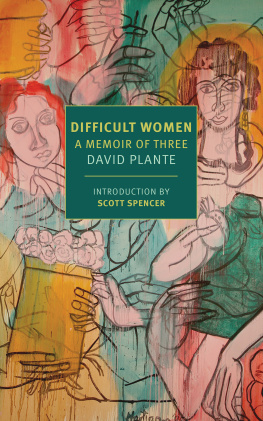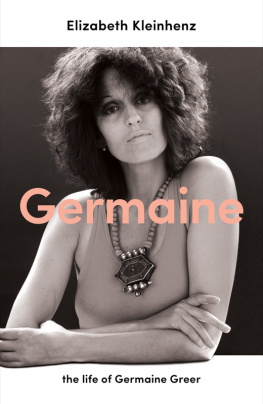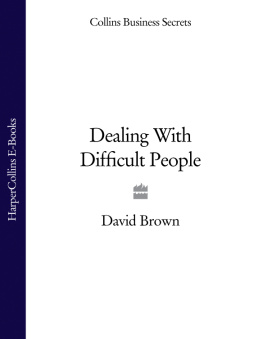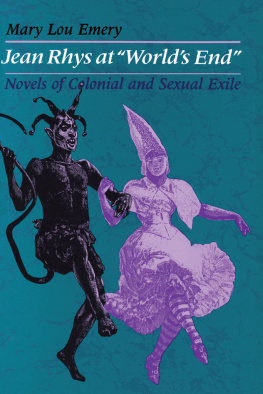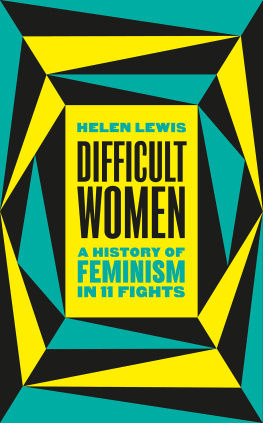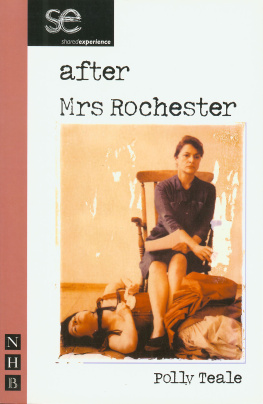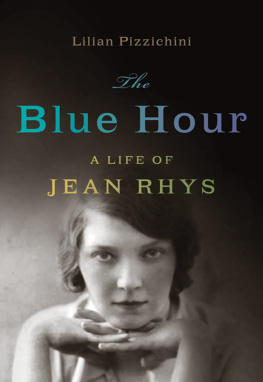DAVID PLANTE is the author of nine novels, including his Francoeur TrilogyThe Family, The Country, and The Woods. He has also written several works of nonfiction in addition to Difficult Women, most recently The Pure Lover, and published two volumes of selections from his diary, Becoming a Londoner and Worlds Apart. He lives in Lucca, Italy, and Athens, Greece.
SCOTT SPENCER is the author of eleven novels, including Endless Love, A Ship Made of Paper, Man in the Woods, and River Under the Road. He has taught at Columbia University, Williams College, University of Iowa, University of Virginia, and the Bard Prison Initiative.
DIFFICULT WOMEN
A Memoir of Three
DAVID PLANTE
Introduction by
SCOTT SPENCER
NEW YORK REVIEW BOOKS

New York
THIS IS A NEW YORK REVIEW BOOK
PUBLISHED BY THE NEW YORK REVIEW OF BOOKS
435 Hudson Street, New York, NY 10014
www.nyrb.com
Copyright 1979, 1983 by David Plante
Introduction copyright 2017 by Scott Spencer
All rights reserved.
Cover art: Grace Hartigan, Grazie Rosetti, 1995; the Estate of Grace Hartigan; collection of Don and Rosie Shepard, The Woodlands, Texas;
image courtesy of C. Grimaldis Gallery
Cover design: Katy Homans
Library of Congress Cataloging-in-Publication Data
Names: Plante, David author. | Spencer, Scott author of introduction. Title:
Difficult women / by David Plante ; introduction by Scott Spencer.
Description: New York : New York Review Books, 2017. | Series: New York Review Books classics
Identifiers: LCCN 2016059708| ISBN 9781681371498 (alk. paper) | ISBN 9781681371504 (epub)
Subjects: LCSH: Plante, DavidFriends and associates. | WomenGreat BritainBiography. | Novelists, American20th centuryBiography. | Rhys, Jean. | Orwell, Sonia. | Greer, Germaine, 1939
Classification: LCC PS3566.L257 Z463 2017 | DDC 813/.54 [B]dc23 LC record available at https://lccn.loc.gov/2016059708
ISBN 978-1-68137-150-4
v1.0
For a complete list of titles, visit www.nyrb.com or write to:
Catalog Requests, NYRB, 435 Hudson Street, New York, NY 10014
CONTENTS
INTRODUCTION
D avid plantes Difficult Women, his account of his life as a young writer in London in the late 1970s, was first published in 1983; decades later, it continues to divide readers between those who are captivated by its grace and wit, and those who perceive it as disloyal, improper, unkind, and pitiless. A writer of my acquaintance known for her transgressive fiction bridles at the mere mention of Plantes name. Because of this book, she has said, she will never read another word by the man.
There is certainly something startling about the almost childlike frankness with which Plante depicts his three subjectsJean Rhys in her final years, the feminist activist and theorist Germaine Greer, and Sonia Orwell, who, though married to George Orwell for only fourteen weeks before being widowed, carried his (pen) name to the end of her life. Doubtless, my initial pleasure in reading this book was in part voyeuristic. Plante has said that everything in Difficult Women comes word for word from his diaries, and his observations do have the unmediated intimacy of a secret journalany thought he has troubled himself to record, he is willing to share. Its revelations, particularly (and somewhat notoriously) those about Jean Rhys, may approach poor tasteor more importantly risk being accused of poor taste. But the risk of offending others can stir up something vital in a writer, and Plantes gamble with his own reputation has paid off: Difficult Women remains an illuminating workthe writer never seems to bring himself up short, never tells himself I better not say that.
In Difficult Women a preternaturally alert novelist describes how he was bullied and disrespected by three formidable women. Plantes three subjects seem to have no idea or concern that as soon as he returns to his room he will be writing down the slights, slips of the tongue, and the bad behavior he has witnessed. Here, for example, is Plante enduring Sonia Orwells spiky hospitality:
At table, I tried to take my place in the talk, but most of itas I discovered often happened in Londonhad to do with people I didnt know. Whenever I did speak up, Sonia glared at me and said, Thats silly. I kept sweating.... The conversation turned to a writer whose work I didnt like, and I said something about it, and Sonia said to me harshly, almost shouting, What do you know about writing?
In incidents like this, one can feel both the affront and the social claustrophobia of the moment, and an understanding is reached between memoirist and reader: how not to cheer on the Extra Man who is treated harshly? The diary becomes a refuge where wounded pride is offered succorfor certain kinds of poison, writing it down word for word is the best antidote. Yet questions about tact and taste continue to orbit the book, presenting moral challenges not just for the writer but for the reader as well. Difficult Women was Plantes first sustained work of nonfiction and reading it now I am reminded of what Janet Malcolm said about writers who insinuate themselves into the lives of others: Every journalist who is not too stupid or too full of himself to notice what is going on knows that what he does is morally indefensible. Malcolm famously argued that when a writer speaks to a subject there is at the core of the transaction a kind of seduction and betrayal, putting an indelible moral stain on the fabric of the relationship.
He [the writer] is a kind of confidence man, preying on peoples vanity, ignorance or loneliness, gaining their trust and betraying them without remorse. Like the credulous widow who wakes up one day to find the charming young man and all her savings gone, so the consenting subject of a piece of nonfiction writing learnswhen the article or book appearshis hard lesson. Journalists justify their treachery in various ways according to their temperaments. The more pompous talk about freedom of speech and the publics right to know; the least talented talk about Art; the seemliest murmur about earning a living.
One cannot help but wonder if Difficult Women was something of an ambush. And, if so, what was the moral justification for reporting moments in the life of Sonia Orwell and Jean Rhys, both deceased before the books publication, which they might plausibly denounce as an invasion of privacy? Plante is gentler with the living, and Germaine Greer makes it through largely unblemished. Who and what is not fair game in a writers work? Whatever rules of decorum govern the writing of memoir, Plante flagrantly disregards them, reminding me of the great blues lyric by Sonny Boy Williamson: Dont start me talkin / Ill tell everything I know. Of course, someone willing to do that has a real hold on our attention. In Plantes book the past, rendered without the faintest elegiac quiver, and seemingly without fear of consequence, remains shocking, as if it were still present.
Plantes memoir has some of the same power as his novels. From the outset of his career he was attuned to the indignities of aging, and to how our bodies wordlessly confess to our helpless animal nature. In The Family, The Woods, and The Country, his trilogy about a Catholic French-Canadian working-class family in Rhode Island, Plantes fascination with what many writers would choose to omit is apparent from the opening pages. When his father leaned forward the bathrobe came away from his chest, and Daniel saw underneath to an armpit. Later in that same novel: Daniel left his mother and brother and walked towards the exit to go to the toilet. He passed the old women sitting in a long row along the side of the hall, under the pipes.... Their mouths were turned down at the corners; they had chin hair; their arms were fat and loose-fleshed, and they kept them folded. Daniel walked at a distance from them, imagining they would emit a smell.

